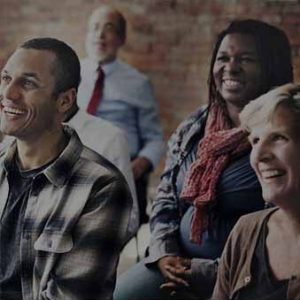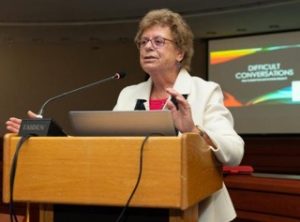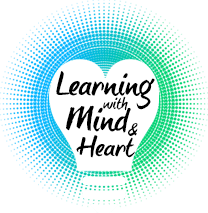Diversity & Inclusion Education

LEARNING WHAT YOU’RE AFRAID TO FIND OUT
Everybody has unconscious bias. It’s unconscious. That’s why we don’t know about it. We don’t know it’s there until we say something we think is offensive. Then we stumble over a sincere but often inept apology. Sometimes the apology makes it worse. Unconscious Bias is the stumbling block in almost every conversation about cultural difference and all the other differences that make us uncomfortable. What’s going on? How do we find out what is in our unconscious minds? How do we avoid our discomfort in these conversations? We don’t usually want to make avoidable mistakes in public if we can make them in private and self-correct before we get embarrassed.
Learning with Mind and Heart offers the workshops described below which can be used to enhance the skills and abilities of professional colleagues, students and administrative staff. These descriptions are generic. When workshops are contracted for a specific work or learning environment, they are individually designed to meet the needs of the organization.
Individual Insight and Dialogue Coaching
This is a one-on-one, confidential coaching/advising service for folks who aren’t sure what to say or how to approach a difficult conversations in supervisory, mentoring or other relationships. Clients will have the opportunity to clarify their concerns and practice speaking about their situation and methods of speaking and listening effectively under stressful circumstances. Zoom and facetime platforms will be used. The “Contact Me” page at the back of this site should be used to request appointments.
Unconscious Bias – recognizing it and neutralizing it
Goals:
- Participants will learn how to recognize the signs of Unconscious Bias and feel comfortable with their own awareness.
- Participants will identify the biases that they may have inherited from their families or acquired from the media.
- They will then learn to relax their own tensions when they become aware that these biases are operating.
- They will practice the difficult conversations that enable people to build trust and develop the communication skills to create healthy relationships.
Critical conversations about Race and other Differences
Goals:
- To introduce participants to the major elements of structural, interpersonal and personal racism and other forms of bias;
- To teach participants to recognize and address the dynamics of conversations that generate conflict
- To train participants in facilitation skills so that conflicts can be acknowledged, managed and addressed in support of mutual understanding.
Compassionate listening- an approach to problem solving and consensus building
Goals:
- To teach participants to listen for overt and covert meaning in conversations;
- To help participants suspend judgment, quiet the mental chatter that leads to not-listening and respond to a speaker using methods that convey accurate understanding;
- To teach participants to finds points of agreement among differing perspectives and weave them into a consensus of purpose.
Narrative conversations as a road to building trust- for intact work teams
Goals:
- To support participants in reviewing the trajectories of their lives, careers and other personal journeys;
- To teach participants to listen compassionately to the stories of others;
- To teach the skills of compassionate listening as a process of building trust;
- To encourage further introspection and conversation by use of journaling, photography or other forms of personal expression/introspection.
Creating inclusive classrooms
Goals:
- To describe the relationship between self and learning and how it various among identity groups;
- To teach faculty members how to construct classroom activities that acknowledge identity differences among students;
- To teach discussion leading skills that create a sense of inclusion for all students and create connections among students from different identity groups.
Most “diversity” training gives you information you don’t exactly know how to use or techniques to talk about uncomfortable subjects. Talking across lines of cultural difference isn’t about techniques. It’s about creating relationships of honesty, empathy and respect. We only learn how to do this with practice.
Challenging Racist Remarks: Techniques for Making Discussions Effective
When we hear people make offensive or insensitive comments about race or other differences, our typical reaction often is “I didn’t know what to say.” This workshop is an informal dialogue among people who want to plan effective responses to racist remarks and microaggressions. Through conversations and shared experience participants will develop a set of responses that they can use to become more effective in challenging racism when they hear it. Enrollment is open to all at no cost. Groups will be scheduled as needed. Contact Jane Fried through the “contact us” page on this site.

KEYNOTE AND MOTIVATIONAL SPEAKING
Potential topics include cross-cultural competence and dialogue; the role of self-authorship in learning; leadership in a multicultural world; racism and antiracism; eliminating fear from relationships; mindfulness and stress reduction ( interactive). As an experienced speaker, group leader and teaching, I am open to developing new topics for specific audiences.
Dr. Jane Fried is a Licensed Professional Counselor who has more than thirty years’ experience teaching people how to talk to each other about uncomfortable subjects. Private conversations with her about discussions you need to have in your personal or professional life will give you a chance to set your own goals, anticipate the ways in which the other people will receive what you have to say and avoid the most difficult eruptions of unconscious bias.
Click here to read more about race, racism, white fragility and talking about race.
Learning With Mind and Heart
